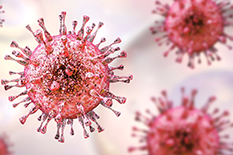Researchers' Virus Discovery Could Help Fight Autoimmune Disease
Researchers' Virus Discovery Could Help Fight Autoimmune Disease

(Illustration by iStock)
Human cytomegalovirus (HCMV) may not be a household name, but the sheer ubiquity of this strain of the herpes virus means it’s present in nearly every household.
Normally dormant in the cells of 50 to 80 percent of the population, HCMV sometimes flares up when the immune system is weakened, causing a flulike illness capable of endangering very young children, elderly people and those with compromised immune systems. Its most harmful effect, however, is congenital birth defects, for which HCMV is the world’s No. 1 infectious cause.
But new research by Xiaoping Zhu, professor and chair of the Department of Veterinary Medicine at the University of Maryland, demonstrates how a protein associated with HCMV may also be a key to symptom relief from hard-to-treat autoimmune diseases such as lupus or rheumatoid arthritis. In a paper published online today in Nature Communications, Zhu and colleagues reveal a mechanism that HCMV uses to evade our immune systems—a discovery that could lead to multifaceted treatment and prevention of such illnesses.
The immune system fights infection with two virtual arms: one at the cellular level, and the other at the antibody level. The characteristics of HCMV’s US11 protein that allow the virus to evade white blood cells that kill viruses on the cellular level are well known, but Zhu and colleagues uncovered a function of the same protein that impairs antibody immunity.
“This is the first time that we discovered that this virus, or any pathogen, has this strategy to destroy this receptor function and reduce antibody functionality,” Zhu said. “Antibodies are also used to treat diseases like AIDS, cancer and make vaccines, and this mechanism makes that less effective. By understanding this function, we can hopefully figure out methods to block that mechanism in the future.”
Antibody immunity normally prevents viruses from entering and infecting cells, while labeling the infected cells for destruction by white blood cells. US11 attacks a specific receptor that not only naturally bolsters immunity, but also directs protective antibodies mothers to be transferred to fetuses. With this receptor impaired, HCMV may reduce transmission of these critical antibodies, resulting in vulnerability to all sorts of birth defects, and at the very least compromising children’s immunity throughout their life.
“HCMV stays asleep inside our cells,” Zhu said. “Then one day, you get stressed, you have too much going on, and your immunity decreases, allowing the virus to spring up again.”
The research funded by the National Institutes of Health may provide more than just new insight into fighting HCMV’s harmful effects; it suggests the possibility of leveraging the virus’ US11 protein to help patients struggling with autoimmune diseases, Zhu said.
When it comes to autoimmune antibodies, “overproduction causes damage on our own tissues and cells, swelling in the joints, and substantial pain,” Zhu said. “Since this protein US11 can facilitate antibody degradation and suppress antibody function, it could be used in humans to treat autoimmune disease and target these disease-causing antibodies to indirectly benefit patients with immune diseases.”
This therapeutic prospect is being patented by UMD through Zhu and his former doctoral student, Xiaoyang Liu Ph.D. ‘18, who say the research should benefit both human and animal health. “Similar knowledge can be used to promote animal and human health, and diseases pass directly from animals to humans and vice versa,” Zhu said.
This article originally appeared in Maryland Today.
July 9, 2019
Prev Next
Connect
Did You Know

UMD is the only major public research university inside the Washington, DC beltway!!
